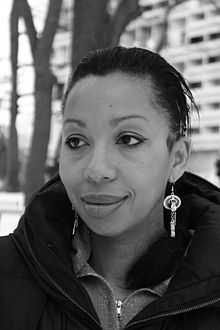Marie NDiaye
| Marie NDiaye | |
|---|---|
 | |
| Born |
4 June 1967 Pithiviers, Loiret, France |
| Occupation |
Novelist Essayist Playwright |
| Period | 1984–present |
Marie NDiaye (born June 4, 1967, in Pithiviers, Loiret) is a French novelist and playwright. She published her first novel, Quant au riche avenir, when she was only 17 and she won the Prix Femina in 2001 for her novel Rosie Carpe. Her play Papa doit manger has been taken into the repertoire of the Comédie française.
Biography
Ndiaye was born in Pithiviers, France, less than a hundred kilometers south of Paris, to a French mother and a Senegalese father. She grew up with her mother in the suburbs of Paris. Her parents met as students in the mid 1960s, but her father left for Africa when she was only one year old.
She began writing at the age of 12. As a senior in high school, she was discovered by Jerome Lindon, founder of the Editions de Minuit [Midnight Publications], who published her first novel, "Quant au riche avenir" '.[1] After her first novel she wrote a further six novels, all published by Minuit, and a collection of short stories. She also wrote her Comédie Classique, a two-hundred-page novel made up of a single sentence, which was published by POL when she was 21 years old. As well as writing novels, Ndiaye has written a number of plays and a screenplay. Papa doit manger is only the second play by a female writer to be taken into the repertoire of the Comédie française.
In 1988, NDiaye spoke out, directing a letter to the press in which she accused the successful author Marie Darrieussecq of trickery. According to NDiaye, the latter was strongly inspired by "La Sorcière", published two years earlier, to write her second novel "Naissance des fantômes", as reported by the newspaper Libération [2]". Nothing in their very slim connection predicted the missteps of Marie Darrieussecq, who other authors have since similarly accused (see Camille Laurens).
Her novel Trois femmes puissantes won the 2009 Prix Goncourt.[3]
Exile in Berlin
In an interview published by "Les Inrockuptibles" on August 30, 2009, NDiaye declared about Sarkozy's France, "I find that France monstrous. The fact that we [with her companion (the writer Jean-Yves Cendrey) and their three children-- editor's note] have chosen to live in Berlin for two years is far from being unrelated to that. We left just after the elections, in a large part because of Sarkozy, even if I am very aware that saying that can seem snobbish. I find that atmosphere of vulgarity and heavy policing detestable ... Besson, Hortefeux, all of those people, I find them monstrous".[4]
Works
Novels and short stories
- Quant au riche avenir - Minuit, 1985 (ISBN 2-7073-1018-2)
- Comédie classique - P.O.L, 1988 (ISBN 2-86744-082-3)
- La femme changée en bûche - Minuit, 1989 (ISBN 2-7073-1285-1)
- En famille - Minuit, 1991 (ISBN 2-7073-1367-X)
- Un temps de saison - Minuit, 1994 (ISBN 2-7073-1474-9)
- La Sorcière - Minuit, 1996 (ISBN 2-7073-1569-9)
- Rosie Carpe - Minuit, Prix Femina 2001 (ISBN 2-7073-1740-3)
- Tous mes amis, nouvelles - Minuit, 2004 (ISBN 2-7073-1859-0)
- Autoportrait en vert - Mercure de France, 2005 (ISBN 2-7152-2481-8)
- Mon cœur a l'etroit - Gallimard, 2007 (ISBN 978-2-07-077457-9)
- Trois femmes puissantes - Gallimard, Prix Goncourt, 2009 (ISBN 978-2070786541)
- Ladivine - Gallimard, 2013 (ISBN 978-2-07-012669-9)
Plays
- Hilda - Minuit, 1999 (ISBN 2-7073-1661-X)
- Papa doit manger - Minuit, 2003 (ISBN 2-7073-1798-5)
- Rien d'humain - Les Solitaires Intempestifs, 2004 (ISBN 2-84681-095-8)
- Les serpents - Minuit, 2004 (ISBN 2-7073-1856-6)
Children's novels
- La diablesse et son enfant, illustration Nadja - École des Loisirs, 2000 (ISBN 2211056601)
- Les paradis de Prunelle, illustration Pierre Mornet - Albin Michel Jeunesse, 2003 (ISBN 2226140689)
- Le souhait, illustration Alice Charbin - École des Loisirs, 2005 (ISBN 2211079628)
Essays
- La naufragée - Flohic, 1999 (ISBN 2842340620)
Screenplay
- White Material (2009), co-written with director Claire Denis
References
- ↑ Libre d’écrire, portrait dans Le Monde du 3 novembre 2009
- ↑ Marie NDiaye polémique avec Marie Darrieussecq dans Libération du 3 mars 1998
- ↑ Novelist NDiaye wins France's top literary prize
- ↑ L'écrivain Marie Ndiaye aux prises avec le monde interview de Marie NDiaye par Nelly Kaprielian dans Les Inrockuptibles du 30 août 2009
External links
| Wikimedia Commons has media related to Marie NDiaye. |
- Bio-bibliographie de Marie NDiaye - The University of Western Australia
- Marie Ndiaye, in Label France (magazine), No.59 2005
- Critical bibliography (Auteurs.contemporain.info)
- "Où situer Marie Ndiaye?" by Véronique Bonnet (in French)
- The U.S. premiere of Hilda
|